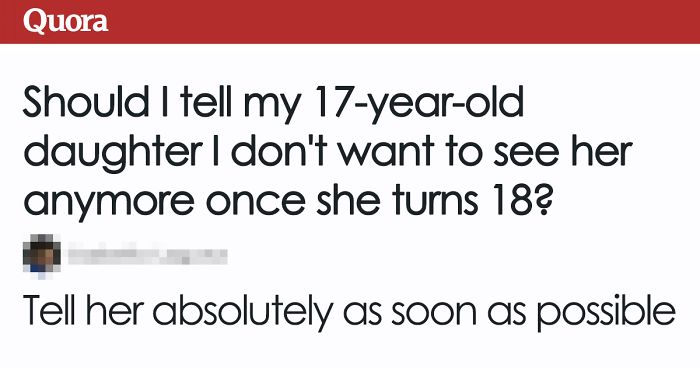
Parent Asks How To Tell Her Kid She Doesn’t Want To See Her Anymore Once She Turns 18, Gets Shut Down
In a perfect world, all parents would love their children. Unfortunately, ours isn’t a perfect world and some parents can’t wait for their kids to grow up so they can kick them out of their lives.
The internet was horrified when they saw a post by somebody who asked whether they should tell their daughter that they don’t want to see her anymore once she turns 18. And they thought that the comeback to the question was spot-on. Some people were quick to judge and shared their own stories about being kicked out of their homes. However, other internet users had different opinions about the situation.
Bored Panda spoke about parents, their kids, and the importance of how children leave home with Lenore Skenazy who is the president of the nonprofit organization Let Grow, dedicated to fighting overprotection and promoting the independence of kids. According to Lenore, a significant part of a child’s confidence comes from knowing that someone believes in them. “A teacher, coach, grandparent, or, of course, parent who thinks you are terrific and ready to wow the world can make all the difference in the world.” However, when that support isn’t there, this can have a big impact on the child.
A parent got shut down after asking a very provocative question online
Image credits: Mish Sukharev (not the actual photo)
Image credits: Imagination-Parking
“A parent saying, ‘Leave when you’re 18’ can be that person, voicing incredible confidence that the child can make it (even if the child is less sure). But the ‘Leave!’ could also be weary disdain: ‘Get out already. I’m washing my hands of you. Goodbye and good luck.’ Whether the message this parent is sending is one of trust or disgust will have a lot more impact on that kid than simply being expected to live on their own,” Lenore explained the that the same action (leaving home) can have very different results depending on how it’s done.
According to Lenore, honesty is the best policy between parents and their kids. “The best way to make sure that a child starting out in the world feels like their parents believe in them—rather than simply being fed up—is for the parent to make it explicit! ‘I have watched you growing up and seen how you work things out when faced with challenges and I believe this next chapter will test you—and you will do great. It may not be easy, because important things rarely are, but you will be happier and stronger for it,’” she gave an example of how things could be done.
She continued: “Also: ‘While it’s time for you to make your way, that doesn’t mean you are leaving my heart. I will always love you and hope we see a lot of each other. This is a new chapter for us both and I wish us both well!'” Now that is a healthy, mature response to a child leaving home and becoming independent.
Life is rarely black and white and reactions to the question and the answer were mixed
So while some supported the clap back, others weren’t so quick to jump on the criticism bandwagon. They thought that it was important to get more context before judging the parent.
Life is rarely black and white. So, according to some internet users, it was important to learn more about the situation: perhaps the parent wasn’t as ‘evil’ as they seemed and had to deal with an incredibly difficult, belligerent teen. In a perfect world, all parents would love their children… and all kids would love and respect their parents.
Unfortunately, in this particular case, additional context is hard to come by, so judging whether or not the parent was completely or only partly in the wrong is incredibly difficult. However, there are two things that we know for sure: the parent was completely honest about their feelings about their daughter; and people think the idea of a parent not loving their child is appalling.
Depending on what part of the world you live in, your legal responsibilities toward your child stop when they turn 18. From a legal perspective, it’s “fine” to abandon an adult child, even if society sees it as cold-hearted. From a more human point of view, however, your child doesn’t stop being your child when they hit an arbitrary age. Parent-kid bonds are meant to last forever, even if everyone doesn’t live under the same roof.
Here’s how people reacted to the Anonymous question
Like most of the comments said; without any context or explanation there's nothing sensible to say about this. So why is it even here on BP?
Because for a long time now, BP seems to care more about clicks than actual content.
Load More Replies...My mom gave me the boot at 18-and-a-day and I don’t blame her one darn bit (long story). She reached out a few months later to try counseling/therapy and I wasn’t so selfish as to say no. We worked it out and she was my best friend and confidante for another 22 years. Miss you, mom!
Even though it’s short, I’m moved by your story. I’m happy you worked things out together!
Load More Replies...If they are going to functionally disown her, then they should tell her so that she can prepare to support herself. They may not like her/ or hate her, but they owe her as her guardians to not just dump her out on the street with no warning. Dumping her out of your house without warning is a sh**ty thing to do, if not illegal in some places. (Parents may have to formally evict, as the dwelling is her legal residence).
Depending on the situation, though, letting some people know ahead of time could lead to the evicted child stealing all the valuables or destroying stuff before they leave. We really need more context. Luckily, most Quora questions are from people getting paid or trying to get off on some fetish, so this might not even be a real question.
Load More Replies...My mother kicked me out at 17. Why? I threatened to call the police the next time my father hit me. Starting at about age 6, he broke my fingers and toes, broke my ribs when he kicked me with his boots on after knocking me down, broke my nose three times, and routinely smashed me in the stomach with his closed fists. Once he kicked me in the back so hard that he damaged my kidneys and I urinated blood for a week. ...///... I was never permitted to see a doctor for any of these injuries, and he was very careful not to leave bruises for a couple of weeks before medical appointments. ...///... My mother let him do it and SHE is the one who kicked me out because she was afraid the police might believe me.
I was "kicked out" by way of finding my stuff on the lawn. My mom hid the rest, and took ti to me when I had a place to live. Meanwhile, I lived ... well, I lived, and let's leave it at that. What did I do? I embarrassed my dad. I wasn't perfect enough. I already had skewed ribs, a spierwebed kneecap, a chipped tibia, an misaligned jaw courtesy my loving father, so.... We made our peace. I knew he'd never like or love me, and oddly, when he died, I could mourn. I still have PTSD from what he *did*, but ... Being gone was the best thing that happened. I feel you, @Aunt Messy. BTW, my sister took my dad's behavior to mean I could be beat up, so I've also urinated blood and so forth. Never a doctor for my injuries. Nope. Never. .... My mom did try, but... Yeah.
Load More Replies...As as Indian, I always find this so weird. I know many Western culturally "kick" their children out once they turn 18. I'm 31 and still live at home with my mom, which they would consider as me being a loser. But it's just different in my side of the world. Parents here don't want their children to move out. Not unless we're getting married or moving to another city for a job. Some people even after getting married will continue to live with their parents. But it also makes sense in our case, because imagine if every young Indian adult who turned 18 needed to move out and find their own place, we would need a lot more space and we would probably all be in debt.
Look into the real estate boom that happened around the 50s (I think it was that decade) in the USA. All these homes were being made but who could fill them? Idea! The real estate business used the media to make it uncool for families to live with each other. Or twist words to make it sound like the responsible thing to do when you're 18 - to move out.
Load More Replies...I saw the headline and knew it was a Quora question before I saw it. Anything that provocative is always suspect ... and I just looked it up & sure enough it's written by "Anonymous". It's a fake troll question just to get people riled up, which for some reason, always seems to work.
I was "out" at 17 and was not a troublesome kid. I had a really messed-up dad. And being gone was the best thing, although the short-term sucked. My sister, who tried to beat our mom, was allowed by our dad to stay living at home till her mid-twenties. If this is a legit question on Quora (always itself a question)... Who knows what family dynamics are at play?
married for 32 yrs. knew this wasn't going to last when, after my son graduated, my ex started making statements that he wanted to get rid of him. he expected that he would leave and not ever come home except for maybe christmas and/or thanksgiving. this is after raising him all of his life. talk about being blindsided! well, husbands come and go but kids are forever.
I feel sad for the people who had abusive parents, and the ones whose parents just kick them out without any notice. You’re supposed to protect and take care of your children why have any if you’re going to treat them so horribly. And same for the other way around. How could you beat up on your mom who carried u for 9 months and gave birth to you. And at least give them a heads up if they’re going to be kicked out. So they can at least figure out a place to stay and etc.
I don't know... I feel like if the child was to blame it would have been phrased differently. "My 17 year old child is emotionally abusing and manipulating me and I don't know how to get out of the situation" etc. This sounds like a parent who just doesn't care. Notice how they say they have "no legal responsibility to her", implying that the only reason they're taking care of her currently is that they legally have to. I don't know, I'm no expert, but this seems downright fishy.
scapegoat child, huh. raise ya hands, fellow members of the scapegoat gang. ✋
My sister chose to move out when she was nineteen. She eventually moved back in with our parents and me. She moved out and back in several times over the years. I moved out with her when I was twenty seven and moved back in later that year. We both finally moved out for good in 2018 and have been out ever since. Every single time that we left the house, it was our choice and we still saw our parents. I don't see how anyone can say that they don't want to see their child again once they turn eighteen unless they are a discipline problem.
If the kid is bad enough to warrant this, 9 times out of 10 it was still the parenting at fault. Ill judge the parent here, thanks.
Maybe it really isn't possible to tell who is the jerk here without context, but speaking from experience, I would say that age five is too young.
As someone who has worked in child psychiatry, it's almost always the parent that is at fault.
Did the daughter do something to deserve this? Is the mother just being a prick? Context please.
My youngest brother was a terror to my Mom. When he turned 18 he demanded the trust that my Dad had left for him. Mom gave it to him with the deal that if he took it he had to move out and not come back. he did, and was of course broke in a year. He wanted to move back in and she told him no. My brothers also wouldn't allow him to stay with them, so that left me, the sis. I took him in on the deal that he would join the military and try to make something of his life. He agreed, but that didn't work either. Sometimes kids are just bad no matter what the parent does. Hard to say with no context.
This one is difficult to interpret without context, however there are some people who really think their obligation stops at the age of majority. I remember when I was in a college course at 19, we had a mature student in the class, she had been married for 12 years and still hadn't made a decision about having children. Most of the class thought it was odd, when asked she stated that she did not" want that 18 year commitment", I just looked at her and asked if she thought a child would stop calling her "mom" at 18 and she just stared back at me without answering, I suspect the lifetime commitment was dawning on her at that moment! I have known people who basically dump the kids at 18, one couple I knew refused to answer to mom and dad to any of their children over the age of 18, first names only, same went for the grandchildren, they had to use their first names or they were entirely ignored.
I agree with the majority in that without some context it's impossible to call. Families aren't always like the "Cleavers". I have 2 sisters that I don't speak with anymore because they are both toxic as hell and one is just plain batshit crazy.
So much to unpack when you don't know what's in the suitcase.... But as a parent (and a daughter who was a total jerk when she was in high school) I can understand the feeling of total helplessness of not knowing what to do. I hope that whatever this mom is going through gets the help she needs, either emotional support on parenting or works on repairing whatever damage has been done.
As many say, you can't judge with the information given My kids and I went through rough patches but I think we worked it out. They were in and out of our home and I now live with my oldest son (I'm a widow with limited income and looking for a job.). I feel damn blessed to know that they love me enough to have me around.
This sounds like they won't be getting child support the moment the child is 18 nothing less. If a child is 17 and a problem then legally in most countries a child can be out of home at 16 so why the additional time if such a burden. In many countries a child who is a bother would also have left home because they can get a job or even share home with other rebellious teens and think that it is more fun etc. Even if a fake question it does not read as though the child is a problem, just paying for it out of pocket might be.
Seems to me that this post should have been called, "Ambiguous situation that may or may not be bad, we don't know the context of these people's relationships, but we will now show how people on the internet who also do not know anything about these people flipped out and judged without any evidence." More proof that the internet has both made us more stupid and more hateful and toxic.
Why do they not want to see their kid when they turn 18??? Why even bother with kids at this point!
I hate how the internet assumes it’s always some selfish, narcissistic, toxic parent. Some children are just awful. Maybe the kid never helps around the house, sneaks out, breaks things, abuses the family, and the mom has had enough and wants the kid out.
If there was context here then it would have been provided. The only thing approaching context is that the parent says they will no longer be legally responsible. It's therefore reasonable to assume that this is someone who has no other reasons to ditch their kid on adulthood. Asshole parent, kids better off without them but still, it'll suck to be dealt with like this..
why not? Is there a law that says you have to support the many crotch droppings you carelessly whelped when you didn't grok birth contrpol.? Help the kid find a spot in a shelter, if you're feeling generous. Otherwise just bag up their stuff and put it on the curb. They probably won't be arsed to collect it.
Like most of the comments said; without any context or explanation there's nothing sensible to say about this. So why is it even here on BP?
Because for a long time now, BP seems to care more about clicks than actual content.
Load More Replies...My mom gave me the boot at 18-and-a-day and I don’t blame her one darn bit (long story). She reached out a few months later to try counseling/therapy and I wasn’t so selfish as to say no. We worked it out and she was my best friend and confidante for another 22 years. Miss you, mom!
Even though it’s short, I’m moved by your story. I’m happy you worked things out together!
Load More Replies...If they are going to functionally disown her, then they should tell her so that she can prepare to support herself. They may not like her/ or hate her, but they owe her as her guardians to not just dump her out on the street with no warning. Dumping her out of your house without warning is a sh**ty thing to do, if not illegal in some places. (Parents may have to formally evict, as the dwelling is her legal residence).
Depending on the situation, though, letting some people know ahead of time could lead to the evicted child stealing all the valuables or destroying stuff before they leave. We really need more context. Luckily, most Quora questions are from people getting paid or trying to get off on some fetish, so this might not even be a real question.
Load More Replies...My mother kicked me out at 17. Why? I threatened to call the police the next time my father hit me. Starting at about age 6, he broke my fingers and toes, broke my ribs when he kicked me with his boots on after knocking me down, broke my nose three times, and routinely smashed me in the stomach with his closed fists. Once he kicked me in the back so hard that he damaged my kidneys and I urinated blood for a week. ...///... I was never permitted to see a doctor for any of these injuries, and he was very careful not to leave bruises for a couple of weeks before medical appointments. ...///... My mother let him do it and SHE is the one who kicked me out because she was afraid the police might believe me.
I was "kicked out" by way of finding my stuff on the lawn. My mom hid the rest, and took ti to me when I had a place to live. Meanwhile, I lived ... well, I lived, and let's leave it at that. What did I do? I embarrassed my dad. I wasn't perfect enough. I already had skewed ribs, a spierwebed kneecap, a chipped tibia, an misaligned jaw courtesy my loving father, so.... We made our peace. I knew he'd never like or love me, and oddly, when he died, I could mourn. I still have PTSD from what he *did*, but ... Being gone was the best thing that happened. I feel you, @Aunt Messy. BTW, my sister took my dad's behavior to mean I could be beat up, so I've also urinated blood and so forth. Never a doctor for my injuries. Nope. Never. .... My mom did try, but... Yeah.
Load More Replies...As as Indian, I always find this so weird. I know many Western culturally "kick" their children out once they turn 18. I'm 31 and still live at home with my mom, which they would consider as me being a loser. But it's just different in my side of the world. Parents here don't want their children to move out. Not unless we're getting married or moving to another city for a job. Some people even after getting married will continue to live with their parents. But it also makes sense in our case, because imagine if every young Indian adult who turned 18 needed to move out and find their own place, we would need a lot more space and we would probably all be in debt.
Look into the real estate boom that happened around the 50s (I think it was that decade) in the USA. All these homes were being made but who could fill them? Idea! The real estate business used the media to make it uncool for families to live with each other. Or twist words to make it sound like the responsible thing to do when you're 18 - to move out.
Load More Replies...I saw the headline and knew it was a Quora question before I saw it. Anything that provocative is always suspect ... and I just looked it up & sure enough it's written by "Anonymous". It's a fake troll question just to get people riled up, which for some reason, always seems to work.
I was "out" at 17 and was not a troublesome kid. I had a really messed-up dad. And being gone was the best thing, although the short-term sucked. My sister, who tried to beat our mom, was allowed by our dad to stay living at home till her mid-twenties. If this is a legit question on Quora (always itself a question)... Who knows what family dynamics are at play?
married for 32 yrs. knew this wasn't going to last when, after my son graduated, my ex started making statements that he wanted to get rid of him. he expected that he would leave and not ever come home except for maybe christmas and/or thanksgiving. this is after raising him all of his life. talk about being blindsided! well, husbands come and go but kids are forever.
I feel sad for the people who had abusive parents, and the ones whose parents just kick them out without any notice. You’re supposed to protect and take care of your children why have any if you’re going to treat them so horribly. And same for the other way around. How could you beat up on your mom who carried u for 9 months and gave birth to you. And at least give them a heads up if they’re going to be kicked out. So they can at least figure out a place to stay and etc.
I don't know... I feel like if the child was to blame it would have been phrased differently. "My 17 year old child is emotionally abusing and manipulating me and I don't know how to get out of the situation" etc. This sounds like a parent who just doesn't care. Notice how they say they have "no legal responsibility to her", implying that the only reason they're taking care of her currently is that they legally have to. I don't know, I'm no expert, but this seems downright fishy.
scapegoat child, huh. raise ya hands, fellow members of the scapegoat gang. ✋
My sister chose to move out when she was nineteen. She eventually moved back in with our parents and me. She moved out and back in several times over the years. I moved out with her when I was twenty seven and moved back in later that year. We both finally moved out for good in 2018 and have been out ever since. Every single time that we left the house, it was our choice and we still saw our parents. I don't see how anyone can say that they don't want to see their child again once they turn eighteen unless they are a discipline problem.
If the kid is bad enough to warrant this, 9 times out of 10 it was still the parenting at fault. Ill judge the parent here, thanks.
Maybe it really isn't possible to tell who is the jerk here without context, but speaking from experience, I would say that age five is too young.
As someone who has worked in child psychiatry, it's almost always the parent that is at fault.
Did the daughter do something to deserve this? Is the mother just being a prick? Context please.
My youngest brother was a terror to my Mom. When he turned 18 he demanded the trust that my Dad had left for him. Mom gave it to him with the deal that if he took it he had to move out and not come back. he did, and was of course broke in a year. He wanted to move back in and she told him no. My brothers also wouldn't allow him to stay with them, so that left me, the sis. I took him in on the deal that he would join the military and try to make something of his life. He agreed, but that didn't work either. Sometimes kids are just bad no matter what the parent does. Hard to say with no context.
This one is difficult to interpret without context, however there are some people who really think their obligation stops at the age of majority. I remember when I was in a college course at 19, we had a mature student in the class, she had been married for 12 years and still hadn't made a decision about having children. Most of the class thought it was odd, when asked she stated that she did not" want that 18 year commitment", I just looked at her and asked if she thought a child would stop calling her "mom" at 18 and she just stared back at me without answering, I suspect the lifetime commitment was dawning on her at that moment! I have known people who basically dump the kids at 18, one couple I knew refused to answer to mom and dad to any of their children over the age of 18, first names only, same went for the grandchildren, they had to use their first names or they were entirely ignored.
I agree with the majority in that without some context it's impossible to call. Families aren't always like the "Cleavers". I have 2 sisters that I don't speak with anymore because they are both toxic as hell and one is just plain batshit crazy.
So much to unpack when you don't know what's in the suitcase.... But as a parent (and a daughter who was a total jerk when she was in high school) I can understand the feeling of total helplessness of not knowing what to do. I hope that whatever this mom is going through gets the help she needs, either emotional support on parenting or works on repairing whatever damage has been done.
As many say, you can't judge with the information given My kids and I went through rough patches but I think we worked it out. They were in and out of our home and I now live with my oldest son (I'm a widow with limited income and looking for a job.). I feel damn blessed to know that they love me enough to have me around.
This sounds like they won't be getting child support the moment the child is 18 nothing less. If a child is 17 and a problem then legally in most countries a child can be out of home at 16 so why the additional time if such a burden. In many countries a child who is a bother would also have left home because they can get a job or even share home with other rebellious teens and think that it is more fun etc. Even if a fake question it does not read as though the child is a problem, just paying for it out of pocket might be.
Seems to me that this post should have been called, "Ambiguous situation that may or may not be bad, we don't know the context of these people's relationships, but we will now show how people on the internet who also do not know anything about these people flipped out and judged without any evidence." More proof that the internet has both made us more stupid and more hateful and toxic.
Why do they not want to see their kid when they turn 18??? Why even bother with kids at this point!
I hate how the internet assumes it’s always some selfish, narcissistic, toxic parent. Some children are just awful. Maybe the kid never helps around the house, sneaks out, breaks things, abuses the family, and the mom has had enough and wants the kid out.
If there was context here then it would have been provided. The only thing approaching context is that the parent says they will no longer be legally responsible. It's therefore reasonable to assume that this is someone who has no other reasons to ditch their kid on adulthood. Asshole parent, kids better off without them but still, it'll suck to be dealt with like this..
why not? Is there a law that says you have to support the many crotch droppings you carelessly whelped when you didn't grok birth contrpol.? Help the kid find a spot in a shelter, if you're feeling generous. Otherwise just bag up their stuff and put it on the curb. They probably won't be arsed to collect it.

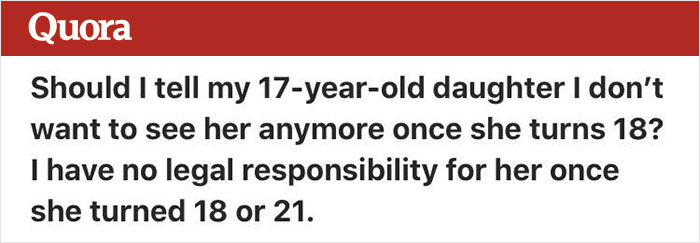
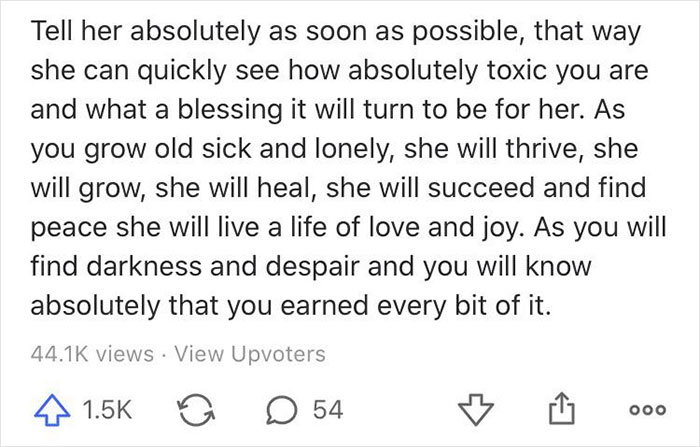
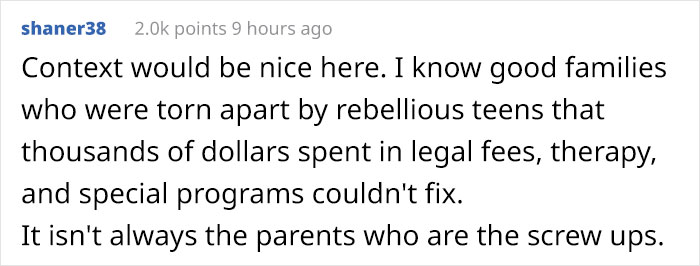


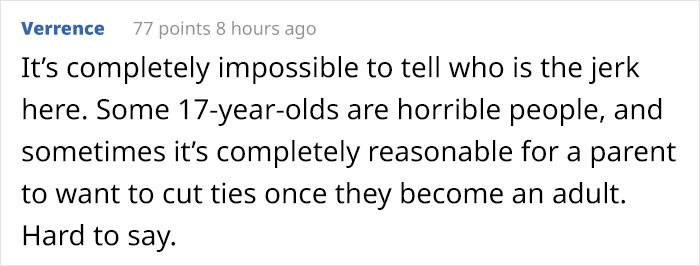


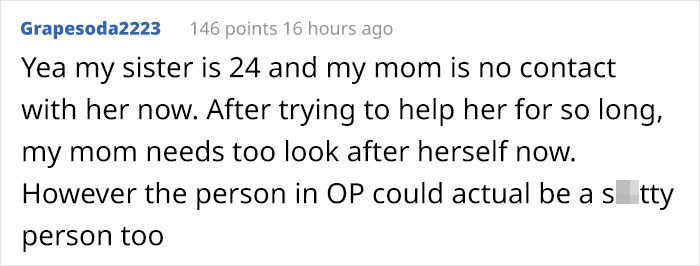

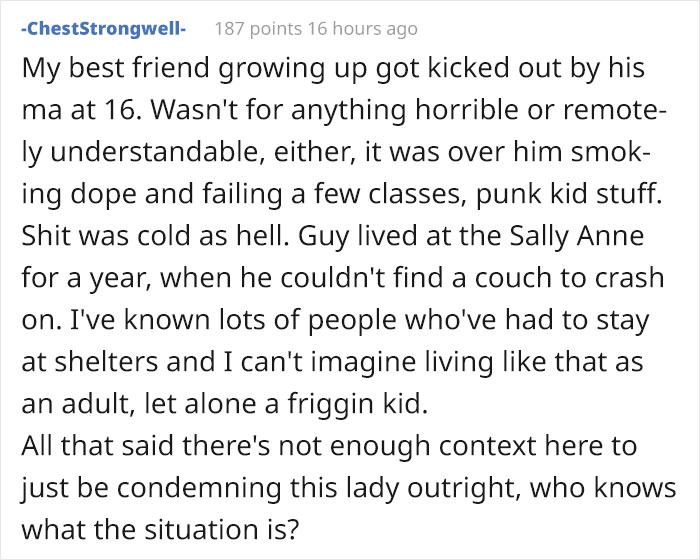
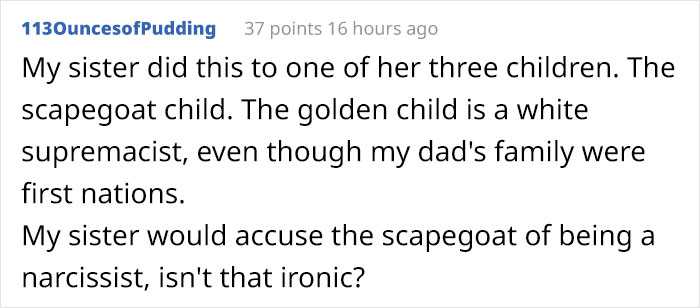









90
55